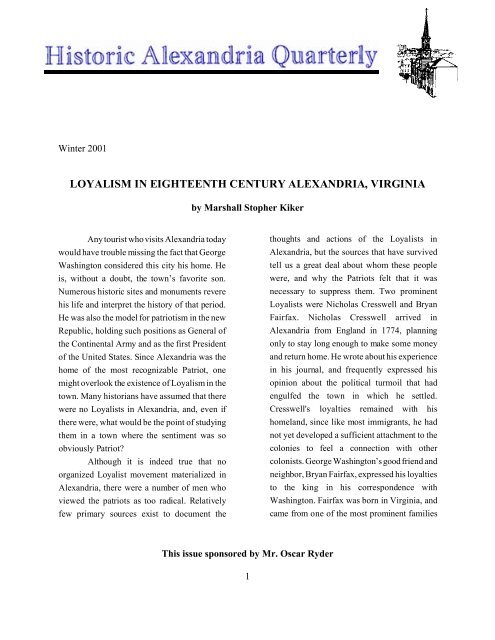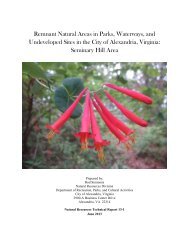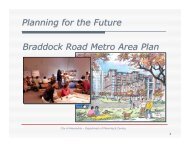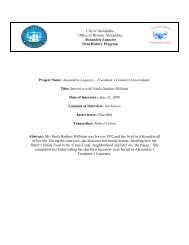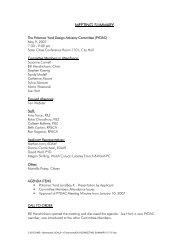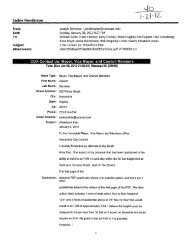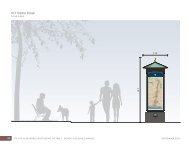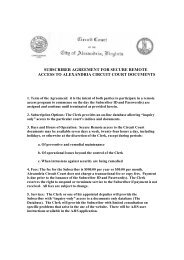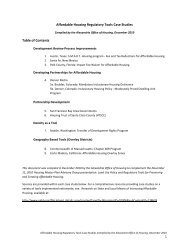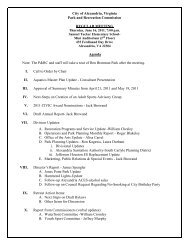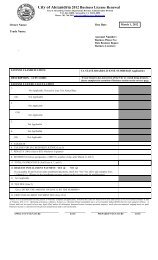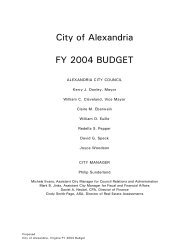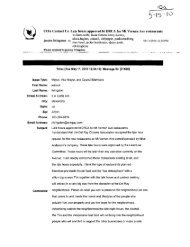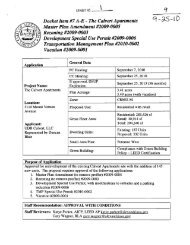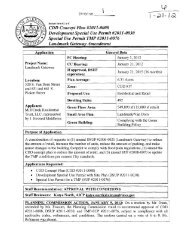LOYALISM IN EIGHTEENTH CENTURY ... - City of Alexandria
LOYALISM IN EIGHTEENTH CENTURY ... - City of Alexandria
LOYALISM IN EIGHTEENTH CENTURY ... - City of Alexandria
Create successful ePaper yourself
Turn your PDF publications into a flip-book with our unique Google optimized e-Paper software.
Winter 2001<br />
<strong>LOYALISM</strong> <strong>IN</strong> <strong>EIGHTEENTH</strong> <strong>CENTURY</strong> ALEXANDRIA, VIRG<strong>IN</strong>IA<br />
Any tourist who visits <strong>Alexandria</strong> today<br />
would have trouble missing the fact that George<br />
Washington considered this city his home. He<br />
is, without a doubt, the town’s favorite son.<br />
Numerous historic sites and monuments revere<br />
his life and interpret the history <strong>of</strong> that period.<br />
He was also the model for patriotism in the new<br />
Republic, holding such positions as General <strong>of</strong><br />
the Continental Army and as the first President<br />
<strong>of</strong> the United States. Since <strong>Alexandria</strong> was the<br />
home <strong>of</strong> the most recognizable Patriot, one<br />
might overlook the existence <strong>of</strong> Loyalism in the<br />
town. Many historians have assumed that there<br />
were no Loyalists in <strong>Alexandria</strong>, and, even if<br />
there were, what would be the point <strong>of</strong> studying<br />
them in a town where the sentiment was so<br />
obviously Patriot?<br />
Although it is indeed true that no<br />
organized Loyalist movement materialized in<br />
<strong>Alexandria</strong>, there were a number <strong>of</strong> men who<br />
viewed the patriots as too radical. Relatively<br />
few primary sources exist to document the<br />
by Marshall Stopher Kiker<br />
This issue sponsored by Mr. Oscar Ryder<br />
1<br />
thoughts and actions <strong>of</strong> the Loyalists in<br />
<strong>Alexandria</strong>, but the sources that have survived<br />
tell us a great deal about whom these people<br />
were, and why the Patriots felt that it was<br />
necessary to suppress them. Two prominent<br />
Loyalists were Nicholas Cresswell and Bryan<br />
Fairfax. Nicholas Cresswell arrived in<br />
<strong>Alexandria</strong> from England in 1774, planning<br />
only to stay long enough to make some money<br />
and return home. He wrote about his experience<br />
in his journal, and frequently expressed his<br />
opinion about the political turmoil that had<br />
engulfed the town in which he settled.<br />
Cresswell's loyalties remained with his<br />
homeland, since like most immigrants, he had<br />
not yet developed a sufficient attachment to the<br />
colonies to feel a connection with other<br />
colonists. George Washington’s good friend and<br />
neighbor, Bryan Fairfax, expressed his loyalties<br />
to the king in his correspondence with<br />
Washington. Fairfax was born in Virginia, and<br />
came from one <strong>of</strong> the most prominent families
in <strong>Alexandria</strong>, yet he felt Washington and the<br />
town’s patriots were too radical. Cresswell and<br />
Fairfax both referred to several others who<br />
agreed with their political opinions. Other<br />
<strong>Alexandria</strong>ns suspected <strong>of</strong> loyalist sentiments<br />
can be discovered through evidence <strong>of</strong><br />
inquisition proceedings against loyalist<br />
properties, although the Fairfax County Court<br />
records for most <strong>of</strong> the 1770s are missing. The<br />
British Public Record Office files indicate the<br />
Virginia loyalists who applied for support from<br />
the British government after they left Virginia.<br />
This evidence, taken together, shows that a<br />
significant number <strong>of</strong> loyalists lived in<br />
<strong>Alexandria</strong> during the 1770s.<br />
The lack <strong>of</strong> ample evidence <strong>of</strong><br />
concerning Loyalist feeling suggests that<br />
Patriots suppressed Loyalism. The political<br />
environment was such that Loyalists were<br />
scared to express their views publicly and<br />
privately. The town was so fervently anti-<br />
Loyalist that few people whose opinions put<br />
them in the minority felt comfortable voicing<br />
their views. When they did express their<br />
opinion, the Patriots silenced them. The<br />
evidence shows that the leading men <strong>of</strong> the<br />
town, like George Washington and George<br />
Mason, suppressed Loyalist feeling and activity<br />
in <strong>Alexandria</strong> with their strong presence and<br />
influence.<br />
A brief history <strong>of</strong> the town <strong>of</strong><br />
<strong>Alexandria</strong> is helpful in understanding the<br />
events <strong>of</strong> the 1770s. On July 13, 1749, a public<br />
auction <strong>of</strong> the half-acre lots <strong>of</strong> a sixty-acre tract<br />
<strong>of</strong> land marked the beginning <strong>of</strong> <strong>Alexandria</strong>’s<br />
existence. Merchants and planters had<br />
petitioned the Virginia House <strong>of</strong> Burgesses in<br />
2<br />
Williamsburg for the establishment <strong>of</strong> this town<br />
because its location on the banks <strong>of</strong> the Potomac<br />
River made it ideal for trading and navigation.<br />
The sixty-acre lot that became <strong>Alexandria</strong><br />
belonged to Philip Alexander, John Alexander,<br />
and Hugh West before the Assembly declared<br />
that it be surveyed, divided into street blocks,<br />
cut into half-acre lots, and auctioned <strong>of</strong>f for<br />
development.<br />
“Portrait <strong>of</strong> George Washington,” Charles Willson<br />
Peale, 1780, oil on canvas, Philadelphia.<br />
Collection <strong>of</strong> the Mount Vernon Ladies’ Association.<br />
Eleven <strong>of</strong> the chief petitioners were<br />
appointed to serve as the first trustees <strong>of</strong> the<br />
town, and their responsibility was to oversee the<br />
design and building <strong>of</strong> the town. The trustees<br />
included: Thomas Lord Fairfax, William<br />
Fairfax, George William Fairfax, Lawrence<br />
Washington (George’s brother), Richard<br />
Osbourne, John Carlyle, John Pagan, William<br />
Ramsay, Gerard Alexander, Philip Alexander,<br />
and Hugh West. The majority <strong>of</strong> these men<br />
purchased town lots at the public auction, in<br />
addition to others, like George Mason and<br />
Colonel William Fitzhugh. These men and their
families factored prominently in the<br />
development <strong>of</strong> the town, and they steered the<br />
town through the tumultuous events <strong>of</strong> the<br />
1770s.<br />
Parliament’s passage <strong>of</strong> the Stamp Act<br />
on March 22, 1765 marked the onset <strong>of</strong><br />
<strong>Alexandria</strong>’s opposition to British policies. The<br />
act required that almost every kind <strong>of</strong> paper<br />
document (i.e. newspapers, court orders, deeds,<br />
wills, cards) had to have a revenue stamp, the<br />
proceeds <strong>of</strong> which went to the British<br />
government. The colonists reacted to this act<br />
with civil disobedience and a refusal to accept<br />
the revenue stamps. Virginia was the first<br />
colony to <strong>of</strong>ficially oppose the Stamp Act, when<br />
its House <strong>of</strong> Burgesses agreed upon the Stamp<br />
Act Resolves in June <strong>of</strong> 1765. According to<br />
Thomas Pressier, “all indications are that the<br />
merchant community <strong>of</strong> <strong>Alexandria</strong> solidly<br />
endorsed the movement to defeat the act.” The<br />
Stamp Act crisis motivated <strong>Alexandria</strong> resident<br />
George Mason to take an active role. Mason<br />
realized that since the courts were closed,<br />
landlords would be unable to take tenants to<br />
court for nonpayment <strong>of</strong> land rentals. On<br />
December 23, 1765, Mason drafted and sent to<br />
George Washington, <strong>Alexandria</strong>’s delegate to<br />
the House <strong>of</strong> Burgesses, a “Scheme for<br />
Replevying Goods and Distress for Rent,”<br />
which provided landlords with a way to collect<br />
rent from tenants without using a stamped legal<br />
document. After the repeal <strong>of</strong> the Stamp Act on<br />
March 4, 1766, Mason’s scheme became<br />
unnecessary, but it serves as evidence that<br />
Mason was active in early resistance to British<br />
policy. After the repeal, it was clear in the<br />
minds <strong>of</strong> most Virginians and other colonists<br />
3<br />
that Parliament could not tax them without their<br />
consent.<br />
The passage <strong>of</strong> the Townsend Duties by<br />
Britain in 1767 again pushed <strong>Alexandria</strong>ns into<br />
action. The Townsend Duties placed taxes on<br />
various goods imported to the colonies from<br />
Britain, like lead, paint, paper, and tea. The<br />
colonies responded with resistance, and began<br />
to set up Non-Importation Associations, spurred<br />
on by Samuel Adams’ circular letter in 1768.<br />
<strong>Alexandria</strong> followed suit and sent George<br />
Washington to the meeting <strong>of</strong> the House <strong>of</strong><br />
Burgesses with the Fairfax County Resolves,<br />
which promised the non-importation <strong>of</strong> British<br />
goods. George Mason and George Washington<br />
played a major role in the creation <strong>of</strong> the<br />
Resolves. They both received copies <strong>of</strong> the<br />
Non-Importation Associations declarations that<br />
were drafted in Philadelphia and Annapolis in<br />
early 1769. On April 5, 1769, the two men<br />
exchanged letters regarding the Associations.<br />
Mason sent Washington some changes to the<br />
Associations on April 23, 1769, and<br />
Washington added the changes to the draft that<br />
he took with him to Williamsburg. Before<br />
Washington could present the draft, Governor<br />
Botetourt dissolved the House <strong>of</strong> Burgesses, but<br />
the men un<strong>of</strong>ficially continued the meeting at<br />
Raleigh Tavern. Washington served on the<br />
committee to draft the agreement, which closely<br />
resembled the draft he and Mason had<br />
developed. <strong>Alexandria</strong> had taken a firm stance<br />
<strong>of</strong> resistance, by agreeing not to import British<br />
goods until the situation changed. George<br />
Mason and George Washington asserted their<br />
role as leaders <strong>of</strong> <strong>Alexandria</strong>’s political<br />
involvement.
The acceptance and enforcement <strong>of</strong> the<br />
non-importation agreement was mixed. Harry<br />
Piper, an <strong>Alexandria</strong> merchant, showed in his<br />
letter book that the first attempt to stop<br />
importation <strong>of</strong> British goods was not taken<br />
seriously in <strong>Alexandria</strong>. On May 12, 1770, he<br />
wrote: “I perceive all the stores on this side [<strong>of</strong><br />
the Potomac] have imported goods as usual, &<br />
hithero no notice has been taken <strong>of</strong> them.”<br />
Although the 1769 Non-Importation<br />
Association was not enforced and failed to<br />
make a difference, an effort was made to<br />
reestablish it on June 22, 1770, when the<br />
delegates again met in Williamsburg. The 1770<br />
Association was printed as a broadside bearing<br />
164 signatures, including those <strong>of</strong> John Carlyle,<br />
William Ramsay, and George Mason, men who<br />
had been active in <strong>Alexandria</strong>’s establishment.<br />
The Association <strong>of</strong> men agreed to publish the<br />
names <strong>of</strong> those who violated the pact, and those<br />
merchants who refused to honor the agreement<br />
were to be boycotted.<br />
George Mason played an important role<br />
in the acceptance <strong>of</strong> this new Association, as he<br />
had done with the first one. In a letter to<br />
Richard Henry Lee on June 7, 1770, he called<br />
for a stricter Association: “the Sense <strong>of</strong> Shame<br />
& the Fear <strong>of</strong> Reproach must be inculcated, &<br />
enforced in the strongest Manner.” The<br />
language used in the 1770 Association was<br />
remarkably similar to Mason’s letter to Lee.<br />
Donald Sweig, the historian <strong>of</strong> Fairfax County,<br />
concluded that “there can be no question that<br />
the letter inspired the resolution.” No<br />
organizations had been created to enforce the<br />
1769 Association, but the 1770 Association set<br />
up inquisition committees, and published the<br />
4<br />
names <strong>of</strong> violators, as Mason had suggested to<br />
Lee.<br />
The Non-Importation Associations <strong>of</strong><br />
1770 were effective at the beginning, according<br />
to Harry Piper, an <strong>Alexandria</strong> merchant. On<br />
August 2, 1770, he confirmed that the articles <strong>of</strong><br />
the Association have generally been signed and<br />
that “the persons who ship the [outlawed]<br />
Goods, as well as the Importers are exposed in<br />
Print by the Committees <strong>of</strong> Inspection.” The<br />
Association seemed to be working, and the<br />
Fairfax County Committee <strong>of</strong> Inspection<br />
demonstrated its vigilance.<br />
George Mason, 1811<br />
Dominic w. Boudet (American, ?-1845) Oil on canvas.<br />
Virginia Museum <strong>of</strong> Fine Arts, Richmond.<br />
Gift <strong>of</strong> David K. E. Bruce<br />
On April 16, 1771, the five committee<br />
members, George Mason, George Washington,<br />
John Dalton, Peter Wagener, and John West,<br />
investigated two shipments <strong>of</strong> goods from<br />
Glasgow to Alexander Henderson <strong>of</strong> Colchester<br />
and William Balmain <strong>of</strong> <strong>Alexandria</strong>. Both men,<br />
who were cleared <strong>of</strong> violating the Association,<br />
complained about the loose enforcement <strong>of</strong> the
agreement in the colonies. The committee<br />
agreed that the pact was being violated outside<br />
Fairfax County, and it made the situation<br />
difficult for Fairfax County merchants.<br />
<strong>Alexandria</strong> enforced the rules, but it seems that<br />
the rest <strong>of</strong> Virginia was not as strict. In other<br />
colonial cities, like Philadelphia and New York,<br />
however, the Associations were very effective<br />
and coercive, occasionally enacting violent<br />
punishments.<br />
As time passed, the Committee in<br />
<strong>Alexandria</strong> relaxed its enforcement <strong>of</strong> the<br />
Association. Other colonies abandoned their<br />
Associations, and Harry Piper wrote on May 17,<br />
1771, “Virginia is now the only colony with an<br />
Association nominally in force.” By June, Piper<br />
noticed that “there seems to be little or no<br />
regard paid to the Association.” The issue’s<br />
importance faded during the summer <strong>of</strong> 1771,<br />
and by August, the Association was <strong>of</strong>ficially<br />
repealed. Fairfax County’s experiments with<br />
non-importation agreements demonstrated that<br />
in order for an agreement <strong>of</strong> this sort to work, it<br />
had to be strictly and universally enforced.<br />
After the summer <strong>of</strong> 1771, pre-<br />
Revolutionary activity in Fairfax County lapsed<br />
for a few years. This trend is reflected in the<br />
correspondence <strong>of</strong> Washington and Mason,<br />
which, as Donald Sweig noted, “contains no<br />
further reference to non-importation, ministerial<br />
conspiracy, or the rights <strong>of</strong> Englishmen until the<br />
late spring <strong>of</strong> 1774.” Up until 1771, Washington<br />
and Mason had been active in the conflict<br />
between the colonies and Britain, and provided<br />
political leadership in Fairfax County. They did<br />
not entertain the idea <strong>of</strong> separating from Britain,<br />
and they were mostly concerned about trade,<br />
commerce and property rights. When Mason<br />
5<br />
entered the conflict with his scheme <strong>of</strong> 1765, he<br />
made no plea grounded in the rights <strong>of</strong> man. He<br />
simply wanted to help his fellow townspeople to<br />
collect their rents.<br />
Washington’s brief comments on the<br />
Stamp Act, his lack <strong>of</strong> comments on the<br />
Townsend duties, and his views <strong>of</strong> the non-<br />
importation agreements demonstrate that he was<br />
primarily concerned with trade and commerce.<br />
He mentioned no violations <strong>of</strong> natural law or<br />
infringements on the rights <strong>of</strong> man; he simply<br />
addresses his economic concerns with British<br />
taxation. Both Washington and Mason, living at<br />
their estates, Mount Vernon and Gunston Hall,<br />
respectively, were plantation owners, and their<br />
main concern was planting crops and trading<br />
them.<br />
Their attitude quickly changed,<br />
however, with the onset <strong>of</strong> events that occurred<br />
in Boston in 1773 and 1774. On the night <strong>of</strong><br />
December 16, 1773, a group <strong>of</strong> Boston Patriots<br />
disguised as Indians threw 340 chests <strong>of</strong> tea that<br />
belonged to the British East India Company into<br />
Boston Harbor. The British Parliament<br />
retaliated by passing the Boston Port Act on<br />
March 31, 1774, which closed the port <strong>of</strong><br />
Boston and threatened to ruin the local<br />
economy. Williamsburg heard the news in May,<br />
and Fairfax County reacted during July. The<br />
Virginia Gazette reported that on July 5th, the<br />
residents <strong>of</strong> Fairfax County had collected<br />
money, barrels <strong>of</strong> flour, and bushels <strong>of</strong> wheat<br />
“for the benefit and relief <strong>of</strong> those (the<br />
industrious poor <strong>of</strong> the town <strong>of</strong> Boston) who by<br />
the last cruel act <strong>of</strong> Parliament are deprived <strong>of</strong><br />
their daily labour and bread.” Nine days later,<br />
on July 14, George Washington and Charles<br />
Broadwater were chosen as Fairfax County’s
epresentatives to the convention in August<br />
1774 <strong>of</strong> the dissolved House <strong>of</strong> Burgesses.<br />
During the summer <strong>of</strong> 1774, George<br />
Washington expressed his opinions about the<br />
colonial conflict with Britain in a letter to Bryan<br />
Fairfax, his longtime friend and neighbor. On<br />
July 4, 1774, he questioned Fairfax, “Does it not<br />
appear, as clear as the sun in its meridian<br />
brightness, that there is a regular systematic<br />
plan formed to fix the right and practice <strong>of</strong><br />
taxation upon us?” Washington believed that<br />
the colonies had exhausted all other avenues <strong>of</strong><br />
resolution <strong>of</strong> the situation, and that those efforts<br />
had failed. The colonies had to stand up for<br />
what they felt was right. Washington’s political<br />
views, by the summer <strong>of</strong> 1774, had become<br />
much more radical, and represent a major<br />
change from his previous attitude. He had been<br />
primarily concerned with the economic well-<br />
being <strong>of</strong> his fellow colonists, but in July, 1774,<br />
he showed that he had begun to see the<br />
problems with Britain as a matter <strong>of</strong> principle.<br />
On July 17, 1774, Mason rode to Mount<br />
Vernon to meet with Washington. A meeting <strong>of</strong><br />
freeholders was scheduled for the next day at<br />
the <strong>Alexandria</strong> courthouse, for the purpose <strong>of</strong><br />
approving what would later be called the<br />
Fairfax Resolves. Legend has it that Mason and<br />
Washington wrote the Resolves together at<br />
Mount Vernon that night, but Donald Sweig<br />
dismissed this as a myth in his article, “A New-<br />
Found Washington Letter <strong>of</strong> 1774 and the<br />
Fairfax Resolves.” According to Sweig, the<br />
Resolves that were adopted by the freeholders<br />
<strong>of</strong> <strong>Alexandria</strong> on the 18th, and taken to the<br />
Virginia convention in Williamsburg, were the<br />
result <strong>of</strong> the work <strong>of</strong> an entire committee <strong>of</strong><br />
men, not just Mason and Washington.<br />
6<br />
Attributing the Resolves to only Mason and<br />
Washington, Sweig argued, “would suggest that<br />
the radical sentiments the document expressed<br />
were primarily those <strong>of</strong> only one or two<br />
members <strong>of</strong> Fairfax County’s ruling elite-later<br />
endorsed by their social inferiors-rather than the<br />
feelings <strong>of</strong> an aroused populace.”<br />
Written on July 17, 1774, the Fairfax County<br />
Resolves were both a bold statement <strong>of</strong> fundamental<br />
constitutional rights and a revolutionary call for an<br />
association <strong>of</strong> colonies to protest British anti-<br />
American actions. Library <strong>of</strong> Congress<br />
The patriotic sentiment expressed in the<br />
Resolves represented the opinion <strong>of</strong> the<br />
majority <strong>of</strong> the freeholders in <strong>Alexandria</strong> in<br />
1774. Mason and Washington exerted a great<br />
deal <strong>of</strong> influence on the drafting <strong>of</strong> the<br />
Resolves, but the freeholders collectively voted<br />
for them. No documented minutes <strong>of</strong> the<br />
meeting have survived, making it impossible to<br />
know what actually transpired, and whether or<br />
not any opposition was expressed. The evidence<br />
will show that prominent members <strong>of</strong> the town<br />
actively suppressed any opposition.<br />
<strong>Alexandria</strong>’s Fairfax Resolves have been<br />
generally regarded by historians, as Sweig noted
in his article, as the “most far-reaching and<br />
radical <strong>of</strong> any presented to the convention.”<br />
They called for a continental congress, for the<br />
prohibition <strong>of</strong> importation, and for means <strong>of</strong><br />
enforcing non-importation. The majority <strong>of</strong><br />
<strong>Alexandria</strong>’s citizens exhibited their radical<br />
view <strong>of</strong> the conflict with Britain by supporting<br />
the Fairfax Resolves. It is impossible to know<br />
how fervent this support was, however, because<br />
they could have supported it only to appease the<br />
town elites.<br />
One example <strong>of</strong> an individual opposed<br />
to the Resolves was Nicholas Cresswell.<br />
Cresswell was born in Edale, a parish <strong>of</strong><br />
Derbyshire, England in December 1750. His<br />
father was a local landowner and sheep farmer.<br />
On March 1st, 1774, Cresswell recorded his<br />
decision to leave England for the colonies to<br />
make a living as a farmer: “I have been studying<br />
and deliberating for a long time how to shape<br />
my course in the world, and am this day come to<br />
a determined resolution to go into America, be<br />
the consequence what it will.” When he was<br />
twenty-four years old, Cresswell left England on<br />
a ship from Liverpool in April, 1774, and<br />
arrived at Urbana, Rappahannock River,<br />
Virginia thirty-eight days later. His ultimate<br />
destination was <strong>Alexandria</strong>.<br />
According to Cresswell, the people he<br />
encountered in Virginia were hospitable, but<br />
talked <strong>of</strong> nothing “but the Blockade <strong>of</strong> Boston<br />
Harbour. The people seem much exasperated at<br />
the proceedings <strong>of</strong> the Ministry and talk as if<br />
they were determined to dispute the matter with<br />
the sword.” When he finally arrived in<br />
<strong>Alexandria</strong> on July 11th, 1774, he presented his<br />
letters to a family friend, Mr. Kirk, also from<br />
Edale, Derbyshire. Mr. Kirk <strong>of</strong>fered to let<br />
7<br />
Cresswell stay at his home and Cresswell<br />
accepted. The journal he kept throughout his<br />
experience in Virginia <strong>of</strong>fers many insights into<br />
the events that unfolded in <strong>Alexandria</strong> in 1774.<br />
Cresswell’s journal unequivocally<br />
reveals a man who objected to the colonists’<br />
reaction to British taxation. Like other recent<br />
British immigrants, Cresswell fell into a<br />
category <strong>of</strong> Loyalists described by Mary Beth<br />
Norton as those who have not yet “developed a<br />
sufficient attachment to the colonies to feel a<br />
unity with other Americans.” Cresswell viewed<br />
<strong>Alexandria</strong>’s rebellious stance as a nuisance that<br />
obstructed his plan to earn a living as a farmer.<br />
On October 19th, 1774, he reported:<br />
“Everything here is in the utmost confusion.<br />
Committees are appointed to inspect into the<br />
Characters and Conduct <strong>of</strong> every tradesman, to<br />
prevent them selling Tea or buying British<br />
Manufactures . . . All trade is almost at a stand.”<br />
Cresswell considered returning home because <strong>of</strong><br />
the difficult economic situation, but decided<br />
against it because he believed that the conflict<br />
would be resolved by the spring. He was<br />
“determined not to return till I can do it with<br />
credit, without those rascals do persuade the<br />
Colonies into a Rebellion.”<br />
Cresswell recorded his opinions in his<br />
journal about the radical events taking place in<br />
<strong>Alexandria</strong> during 1774. Although he failed to<br />
remark on the approval <strong>of</strong> the Fairfax Resolves<br />
in <strong>Alexandria</strong> on July 18th, 1774 (most likely<br />
because he was extremely ill, and preparing to<br />
travel to Barbados at the time), he does remark<br />
on the proceedings <strong>of</strong> the Continental Congress<br />
in November <strong>of</strong> 1774. “This evening went to the<br />
Tavern to hear the Resolves <strong>of</strong> the Continental<br />
Congress,” he wrote. They “read a petition to
the throne and an address to the people <strong>of</strong> Great<br />
Britain. Both <strong>of</strong> them full <strong>of</strong> duplicity and false<br />
representation. I look upon them as insults to<br />
the understanding and dignity <strong>of</strong> the British<br />
Sovereign and People. Am in hopes their<br />
petition will never be granted.” Cresswell was<br />
clear in his abhorrence <strong>of</strong> the colonial<br />
resistance.<br />
Cresswell attended church at the<br />
Presbyterian Meeting House in <strong>Alexandria</strong>, and<br />
his response supports the claims <strong>of</strong> historians<br />
that the church was an important center for<br />
Revolutionary activity. Cresswell was frustrated<br />
with the church’s lack <strong>of</strong> religious priority. On<br />
November 6th, 1774, he wrote: “Went to a<br />
Presbyterian meeting. These are a set <strong>of</strong><br />
rebellious scoundrels, nothing but political<br />
discourses instead <strong>of</strong> religious lectures,” and a<br />
week later he went again, but decides he “won’t<br />
go anymore to hear their Political Sermons.”<br />
Cresswell involved himself in community life,<br />
despite his anti-Patriot stance. In addition to<br />
attending church, he mentioned attending the<br />
ball celebrating the election <strong>of</strong> George<br />
Washington and Major Broadwater as<br />
delegates, and he frequently dined in taverns<br />
where he engaged in fiery political discussions.<br />
Cresswell’s constant presence in town<br />
life, and the fact that he appeared to have<br />
trouble keeping his opinions to himself quickly<br />
became a serious problem with the so-called<br />
“rebellious scoundrels.” He first mentioned the<br />
negative reaction towards him on February 18th,<br />
1775 when he remarked:<br />
“I understand the Committee are going<br />
to take me up as a Spy. I will save them<br />
8<br />
the trouble by decamping immediately.<br />
The Committees act as Justices. If any<br />
person is found to be inimical to the<br />
liberties <strong>of</strong> America, they give them<br />
over to the mobility to punish as they<br />
think proper,and it is seldom they come<br />
<strong>of</strong>f without tarring and feathering. It is<br />
as much as a person’s life is worth to<br />
speak disrespectfully <strong>of</strong> the Congress.<br />
The people are arming and training in<br />
every place. They are all liberty mad.”<br />
Cresswell’s remarks demonstrated the town’s<br />
vigilance against Loyalist feeling. The<br />
Committee he referred to in the quotation was<br />
the town’s Committee <strong>of</strong> Safety, which was<br />
responsible for investigating suspected<br />
Loyalists. The Committee singled him out, and<br />
he felt sure that they opened his letters before<br />
they reached England. The colonists in<br />
<strong>Alexandria</strong>, according to Cresswell’s account,<br />
were capable <strong>of</strong> taking someone’s life if they<br />
spoke against the Continental Congress.<br />
According to Cresswell, <strong>Alexandria</strong> was<br />
certainly not an enjoyable place to live for those<br />
who remained loyal to the British government.<br />
The radical colonists in <strong>Alexandria</strong> would do<br />
whatever they felt necessary to drive out those<br />
that refused to embrace the colonial cause. They<br />
were, as Cresswell called them, “liberty mad.”<br />
Cresswell felt so unwelcome that he<br />
made several attempts to leave <strong>Alexandria</strong>. His<br />
first attempt consisted <strong>of</strong> accepting a job as a<br />
surveyor to Illinois, beginning his journey in<br />
April <strong>of</strong> 1775. The expedition accomplished<br />
little, and even failed to reach Illinois. He<br />
returned to <strong>Alexandria</strong> in October <strong>of</strong> 1775, and
he found the town obsessed with war<br />
preparations against Britain. Cresswell’s<br />
situation is precarious in October <strong>of</strong> 1775:<br />
“ I am now in a disagreeable situation,<br />
if I enter into any sort <strong>of</strong> business I<br />
must be obliged to enter into the service<br />
<strong>of</strong> these rascals and fight against my<br />
Friends and Country if called upon. On<br />
the other hand, I am not permitted to<br />
depart the Continent and have nothing<br />
if I am fortunate enough to escape the<br />
jail. I will live as cheap as I can and<br />
hope for better times.”<br />
It was impossible to do any business in the town<br />
without declaring one’s allegiance to the<br />
Revolution. The leading merchants in the town<br />
were men like John Carlyle, who had signed the<br />
Fairfax Resolves in 1774. Their patriotic<br />
sentiments combined with their economic power<br />
made <strong>Alexandria</strong> a difficult place for a man like<br />
Cresswell to live. Cresswell feared for his<br />
economic and personal well-being.<br />
During the fall <strong>of</strong> 1775, Cresswell felt<br />
he was being closely watched, and he reinitiated<br />
his plans to leave. He reported on October 31st,<br />
1775 that he is “suspected <strong>of</strong> being what they<br />
call a Tory (that is a friend to my country) and<br />
am threatened with Tar and Feathers,<br />
Imprisonment and the D----l knows what.”<br />
These remarks further prove the extraordinary<br />
means that <strong>Alexandria</strong> Patriots took to stamp<br />
out Loyalism. He began to fear political<br />
discussions with the townspeople, for they<br />
might have ulterior motives. On the night <strong>of</strong><br />
November 9th, 1775, he mentioned having<br />
dinner with Doctor Jackson, and engaging in a<br />
9<br />
long dispute with him about the present political<br />
situation. He suspected that the Doctor “was<br />
employed to draw me into a political dispute. I<br />
proceed with great caution and temerity.”<br />
Cresswell had not kept his political sentiments<br />
a secret before this incident, but he proceeded<br />
with caution in the future.<br />
In order to avoid imprisonment by the<br />
Committee <strong>of</strong> Safety, Cresswell was aided by<br />
Thomson Mason on October 21st, 1775. Mason,<br />
<strong>of</strong> Raspberry Plain, Loudon County, and brother<br />
<strong>of</strong> leading <strong>Alexandria</strong> Patriot, George Mason,<br />
took an interest in Cresswell’s situation, and<br />
agreed to post bond for him with the condition<br />
that Cresswell would not leave the country for<br />
six months without the consent <strong>of</strong> the<br />
Committee. Cresswell did not take matters very<br />
seriously, since he resolved two days later to<br />
“get on board the King’s Ship as soon as<br />
possible,” but after that attempt was<br />
unsuccessful, he realized that there was “no<br />
prospect <strong>of</strong> getting home this winter” because<br />
he was “very narrowly watched.” He resigned to<br />
live quietly, and “wait with patience till summer<br />
and then risk a passage.”<br />
Mason helped Cresswell again during<br />
the summer <strong>of</strong> 1776, when he gave him letters<br />
<strong>of</strong> recommendation to Francis Lightfoot Lee,<br />
Thomas Stone, Thomas Jefferson, and John<br />
Rogers, all members <strong>of</strong> the Continental<br />
Congress, asking that Cresswell be allowed to<br />
leave on a ship bound for England. Cresswell<br />
set out for Philadelphia with his letters, and met<br />
with Lee and Jefferson, “who behaved with the<br />
greatest complaisance and politeness,” and gave<br />
him a pass permitting him to travel wherever he<br />
pleased. Cresswell went to New York to board<br />
a ship, but there he ran into a man from
<strong>Alexandria</strong> who knew <strong>of</strong> his Loyalist opinions<br />
and ordered him to go back to Virginia or be<br />
thrown in prison. Back in Virginia, he was<br />
constantly in fear <strong>of</strong> being imprisoned for his<br />
political opinions, and looked for any<br />
opportunity to escape. Thomson Mason<br />
continually helped keep him out <strong>of</strong> jail through<br />
further negotiations with the Committee.<br />
In the spring <strong>of</strong> 1777, Cresswell and his<br />
friend and fellow Loyalist, Colin Keir, made<br />
plans to escape from Virginia, although<br />
Cresswell had been denied permission to leave<br />
by the Governor <strong>of</strong> Virginia. They hired a boat<br />
ostensibly to take them to Gloucester, but their<br />
real intention was to commandeer the boat and<br />
search for the British fleet. They encountered<br />
the British ship, H.M.S. Phoenix, which helped<br />
them get to New York. Keir joined the British<br />
army, but Cresswell, in an interview with<br />
General Howe, declined to join because <strong>of</strong> a<br />
promise he made to Thomson Mason. Howe<br />
approved <strong>of</strong> this “honourable resolution,” and<br />
decided to aide Cresswell in his departure from<br />
the colonies. Finally, after many failed attempts,<br />
Cresswell secured passage on the “Edward” and<br />
set sail for England on July 23, 1777, arriving in<br />
England about a month later. He reflected back<br />
on the changes Virginia had gone through in the<br />
three years since his arrival in 1774. What was<br />
such a beautiful and happy country had<br />
“become the theatre <strong>of</strong> War, the country <strong>of</strong><br />
distraction, and the seat <strong>of</strong> slavery, confusion,<br />
and lawless oppression.”<br />
Cresswell’s journal gives historians a<br />
detailed description <strong>of</strong> what it was like to be a<br />
Loyalist in <strong>Alexandria</strong>. The Patriots,who fought<br />
for human rights and claimed to be protectors <strong>of</strong><br />
virtue, quickly discarded those principles when<br />
10<br />
it came to dealing with Loyalists. As Cresswell<br />
explained, “to cheat him [a Loyalist] is lawful,<br />
to steal from him is serving the cause and<br />
Country.” Cresswell’s journal unequivocally<br />
confirms a Loyalist presence in <strong>Alexandria</strong>.<br />
Through his journal, we can see why few<br />
sources exist to document Loyalist activity:<br />
those suspected faced imprisonment, and found<br />
that their private papers would be confiscated.<br />
Not only was it dangerous to discuss one’s<br />
political opinions in public, as Cresswell found<br />
out after he talked too freely with leading<br />
Patriots in the town taverns, but it was also<br />
dangerous to write about one’s opinions<br />
privately. <strong>Alexandria</strong>’s Committee <strong>of</strong> Safety<br />
rigorously investigated Loyalists and made their<br />
punishments known.<br />
Cresswell stayed at Gadsby’s Tavern for some time.<br />
In his diary he complained about the loss <strong>of</strong> his<br />
overcoat, for which tavern keeper Mary Hawkins had<br />
generously <strong>of</strong>fered to reimburse him. When he came<br />
to collect, however, she had apparently changed her<br />
mind; Cresswell wrote that “the D—d Jade tells me<br />
that I am a Tory and she won’t pay me a Farthing.”<br />
Reprinted with permission from the 1992 Historic<br />
<strong>Alexandria</strong> Antique Show Catalogue.<br />
While Cresswell’s journal proves that<br />
there was at least one Loyalist living in<br />
<strong>Alexandria</strong>, the question <strong>of</strong> whether he was the
only one logically arises. His journal, replete<br />
with references to his Loyalist friends, provides<br />
the answer to this question. Cresswell, having<br />
never owned property in Virginia, constantly<br />
stayed at the houses <strong>of</strong> friends and<br />
acquaintances. On January 5, 1777, Cresswell<br />
wrote about how he celebrated joint birthdays<br />
with a Mr. Neilson in Loudon County: “We<br />
spent it as happily as our situation would<br />
permit. We are <strong>of</strong> the same opinion in political<br />
matters.” Cresswell made friends easily, even<br />
with those who disagreed with him. His family<br />
friend, Mr. Kirk, a Patriot, remained hospitable<br />
to Cresswell, even though association with him<br />
put him in a precarious position with the town.<br />
Cresswell managed to create a network <strong>of</strong><br />
friends, both Patriot and Loyalist, and avoided<br />
imprisonment.<br />
Cresswell’s journalshows that Loyalism<br />
existed in <strong>Alexandria</strong> through its description <strong>of</strong><br />
a network <strong>of</strong> Loyalists living in and around<br />
<strong>Alexandria</strong>. Cresswell was not the only Loyalist<br />
in <strong>Alexandria</strong>; he worked together with other<br />
Loyalists to escape from his inhospitable<br />
environment. He and Colin Keir made plans to<br />
help a group <strong>of</strong> Loyalists escape the <strong>Alexandria</strong><br />
jail. They provided arms and ammunition to the<br />
prisoners, and agreed to meet them at Cedar<br />
Point on the Potomac after the breakout.<br />
Cresswell referred to the incident, when he met<br />
with one <strong>of</strong> the men who managed to escape.<br />
Cresswell and Keir had been unable to keep<br />
their promise <strong>of</strong> meeting at Cedar Point because<br />
they encountered bad weather at sea. On June<br />
19, 1777, Cresswell wrote that John Dodd<br />
reported to him that “they all got <strong>of</strong>f safe, but<br />
Davis their guide, and a Scotch Sergeant who<br />
was so much dispirited at not finding us at<br />
11<br />
Cedar Point agreeable to our promise that they<br />
immediately returned, and delivered themselves<br />
to the mercy <strong>of</strong> the rebels.” The others, who<br />
remained resolute in their plans, continued on<br />
their journey, “by traveling in the night and<br />
through the Woods at night they got to<br />
Delaware Bay, where they seized a boat and got<br />
aboard the Roebuck, Man <strong>of</strong> War.” John Dodd,<br />
who told Cresswell this information, was<br />
obviously among those who eluded capture.<br />
The examination <strong>of</strong> other sources helps<br />
to explain the incident that Cresswell referred to<br />
in this passage. A notice from <strong>Alexandria</strong> dated<br />
April 16, 1777 appeared in the Virginia Gazette<br />
confirmed the escape:<br />
“One hundred dollars reward for apprehending<br />
the following prisoners <strong>of</strong> war, who made their<br />
escape last night about 11o’clock, and it is<br />
supposed went down the River Potowmack, vis.<br />
James Parker, George Blair, William<br />
Cunningham, John Rothery, Josias Rogers, John<br />
Todd, William Nichols, and John Dunker.”<br />
The ‘Josias Rogers’ was most likely the<br />
‘Mr. Rogers’ Cresswell referred to in his<br />
journal, and the ‘John Todd’ was most likely the<br />
‘John Dodd,’ with whom Cresswell mentioned<br />
meeting. The Virginia Gazette and Cresswell’s<br />
journal prove the existence <strong>of</strong> a Loyalist<br />
conspiracy in <strong>Alexandria</strong>. Loyalists joined<br />
together, and planned an escape from the jail.<br />
They were able to communicate with other<br />
Loyalists, like Cresswell and Keir, who were<br />
not in jail, to help them with their escape.<br />
Another passage in Cresswell’s journal<br />
identified a second group <strong>of</strong> Loyalists in<br />
<strong>Alexandria</strong>. Scotch Sergeant Davis, who<br />
Cresswell identified as the guide for the<br />
escapees, and among those who returned to
<strong>Alexandria</strong> after they abandoned their plan to<br />
escape, impeached a number <strong>of</strong> Loyalists.<br />
Cresswell reported: “Davis has impeached Mr.<br />
Wales, that is Mr. Keir’s uncle, Mr. George<br />
Muir, Mr. Chisum, Mr. Kilpatrick, Mr. Hepburn<br />
and Mr. Murdo, that they were all sent to<br />
Williamsburg Jail and had their trials on the<br />
30th. Of May.” The journal <strong>of</strong> Ebenzer Hazard,<br />
a surveyor <strong>of</strong> the post <strong>of</strong>fice who was passing<br />
through Fairfax County during the midst <strong>of</strong><br />
these events, confirmed the information in<br />
Cresswell’s journal. Hazard wrote on May 22,<br />
1777 that “some Tories lately formed a Plan for<br />
burning <strong>Alexandria</strong> & murdering the<br />
Inhabitants. . .but their plan was discovered, &<br />
they are now in Gaol here.” Hazard’s report<br />
identified a plot to burn <strong>Alexandria</strong> as the<br />
reason these men were put in jail. Hazard’s<br />
entry on May 23 confirmed the identity <strong>of</strong> the<br />
men named in Cresswell’s journal: “The Tories<br />
who intended to destroy <strong>Alexandria</strong> are sent <strong>of</strong>f<br />
today, in irons, to Williamsburgh to be tried.<br />
Two <strong>of</strong> them whose names are Wales and<br />
Hepburn, are Men <strong>of</strong> some Property:-- there are<br />
seven in all; -- no Americans among them.” The<br />
Virginia Gazette also documented the incident<br />
on May 30: “On Wednesday last, Thomas Davis<br />
and some other persons were brought down and<br />
committed to the public jail, being accused <strong>of</strong><br />
facilitating the escape <strong>of</strong> some prisoners <strong>of</strong> war<br />
from <strong>Alexandria</strong>, and other treasonable<br />
practices.” This description blamed the<br />
Loyalists’ arrest on helping prisoners escape<br />
from jail, but does not mention the plot to burn<br />
<strong>Alexandria</strong> that Hazard mentioned. It is possible<br />
that Hazard was simply repeating a rumor.<br />
Cresswell’s account also makes no reference to<br />
a plot to burn the town, and the information in<br />
12<br />
his journal connected the arrest <strong>of</strong> Davis and the<br />
others to the escape plot. Cresswell’s<br />
information about the arrest and trial <strong>of</strong> the men<br />
was followed by a notice <strong>of</strong> a reward for<br />
Cresswell and Keir’s apprehension for their role<br />
in aiding the escape. Regardless <strong>of</strong> whether or<br />
not a plot to burn the town existed, it is clear<br />
from these primary sources that Cresswell was<br />
not the only Loyalist living in <strong>Alexandria</strong>. He<br />
was a member <strong>of</strong> a network <strong>of</strong> men, who<br />
conspired to free jailed Loyalists and<br />
engineered an escape to England.<br />
Bryan Fairfax is an example <strong>of</strong> another<br />
Loyalist in <strong>Alexandria</strong>. While the journals <strong>of</strong><br />
Nicholas Cresswell, Ebenezer Hazard, and the<br />
Virginia Gazette prove that Loyalism existed in<br />
<strong>Alexandria</strong>, none <strong>of</strong> the Loyalists identified thus<br />
far were born in America. All <strong>of</strong> them were<br />
born in Britain and made attempts to return to<br />
their homeland. In order to make a strong case<br />
for the existence <strong>of</strong> Loyalism in <strong>Alexandria</strong>,<br />
American Loyalists also need to be identified. It<br />
is logical for a recent immigrant to still feel<br />
connected to his homeland, but it is more daring<br />
for someone who was fully connected to a<br />
colonial community from birth to disagree with<br />
the majority <strong>of</strong> his fellow townspeople. Bryan<br />
Fairfax is an example <strong>of</strong> a Loyalist who was<br />
born in the colonies. His family was one <strong>of</strong> the<br />
most powerful families in Fairfax County,<br />
which was their namesake. The Fairfax family’s<br />
estate, Belvoir, was located on the land next to<br />
Lawrence Washington’s estate, Mount Vernon.<br />
Bryan Fairfax was born in 1736, making him<br />
four years younger than Lawrence’sson George.<br />
Bryan Fairfax and George Washington grew up<br />
together as neighbors, and developed a deep<br />
friendship maintained by a long correspondence
that began in 1754 and lasted until<br />
Washington’s death in 1799.<br />
A number <strong>of</strong> the letters they exchanged<br />
have been preserved and published by Fairfax<br />
County, and they reveal a friendship that<br />
endured a major difference in political opinion.<br />
Washington’s elucidation <strong>of</strong> the colonial cause<br />
against the tyranny <strong>of</strong> Britain centered on the<br />
colonists’ right not to be taxed without their<br />
consent: “I think the Parliament <strong>of</strong> Great Britain<br />
hath no more right to put their hands into my<br />
pocket, without my consent, then I have to put<br />
my hands into yours for money.” Fairfax did not<br />
agree with his friend’s radical position against<br />
British policy. He favored a more moderate<br />
approach. In a letter to Washington in July 17 <strong>of</strong><br />
1774, he presented his position against the<br />
adoption <strong>of</strong> Fairfax Resolves, which was<br />
scheduled for the next day at the <strong>Alexandria</strong><br />
courthouse. He advocated further petitioning to<br />
Parliament, instead <strong>of</strong> the drafting <strong>of</strong><br />
resolutions: “I ardently wish that no Resolves<br />
had been now entered into. . . No conditional<br />
resolutions, which may be formed at the time,<br />
should be published until it is known that the<br />
Petition has no effect.” Fairfax’s letter proves<br />
that not every leading community member in<br />
<strong>Alexandria</strong> approved <strong>of</strong> the Fairfax Resolves,<br />
which the freeholders voted to send to the<br />
convention in Williamsburg as representative <strong>of</strong><br />
the town’s position against Britain.<br />
In this same letter, Fairfax wrote out his<br />
objections to specific Resolves, and asked<br />
Washington to read his objections at the<br />
freeholders meeting. He presented his<br />
objections when he wrote: “I come now to<br />
consider a Resolve which ought to be the most<br />
objected to, as tending more to widen the breach<br />
13<br />
and prevent a Reconciliation than any other. I<br />
mean that wherein the Authority <strong>of</strong> Parliament<br />
is almost in every instance denied.” Fairfax<br />
respected the authority <strong>of</strong> Parliament over the<br />
colonies, and believed reconciliation should be<br />
orchestrated. Fairfax’s knowledge <strong>of</strong> the Fairfax<br />
Resolves on the 17th proved Donald Sweig’s<br />
assertion that the Resolves were not written by<br />
Mason and Washington at Mount Vernon on the<br />
night <strong>of</strong> the 17th. Fairfax obviously had a copy<br />
<strong>of</strong> the Resolves on the 17th because he referred<br />
to them by number. While they probably did not<br />
compose the Resolves alone on the 17th, Mason<br />
and Washington exerted a great deal <strong>of</strong><br />
influence in the drafting, which is evident in the<br />
letters between Mason and Washington.<br />
Fairfax’s letter also demonstrated Washington's<br />
participation in the drafting <strong>of</strong> the Resolves<br />
because it was Washington that Fairfax wrote<br />
with his objections.<br />
Bryan Fairfax, oil on canvas, M..Minnegerode<br />
Andrews, after a miniature by an unknown artist.<br />
Date unknown.<br />
Fairfax recognized the power that<br />
Washington hadover the freeholders who would<br />
approve the Resolves on July 18th. He asked<br />
Washington to read his letter <strong>of</strong> objections to
the Resolves at the meeting <strong>of</strong> the freeholders:<br />
“Thus, Sir, I have made some Objections as it<br />
appeared on me to do, and hope that you will<br />
cause this Letter to be read as containing my<br />
Sentiments on this important occasion.” The<br />
response to Fairfax’s request from Washington<br />
reveals a great deal about the way things<br />
operated in <strong>Alexandria</strong>. Washington did not<br />
read Fairfax’s letter at the meeting, and he<br />
<strong>of</strong>fered many excuses for this rebuff.<br />
Washington acknowledged that he received the<br />
letter, but that it “was not presented to me till<br />
after the resolutions had been revised, altered,<br />
and corrected by the Committee.” Upon receipt<br />
<strong>of</strong> the letter, he “hastily run it over, and handed<br />
it around to the gentlemen on the bench . . . but<br />
as no person seemed in the least disposed to<br />
adopt your sentiments.” Washington claimed<br />
that everyone at the meeting supported the<br />
adoption <strong>of</strong> the resolutions, “except for Mr.<br />
Williamson, who was for adopting your advice<br />
literally, without obtaining a second voice on<br />
his side,” and the other gentlemen who had seen<br />
the letter, advised Washington “not to have it<br />
read, as it was not like to make a convert, and<br />
repugnant . . . to the very principle we were<br />
contending for.” As Washington told it, almost<br />
no one present at the meeting agreed with<br />
Fairfax, so the letter went unread. Fairfax’s<br />
response to Washington’s explanation reported<br />
a different view <strong>of</strong> the proceedings at the<br />
freeholders meeting. While Fairfax accepted<br />
Washington’s reasons for not reading the letter,<br />
he had heard from those that attended the<br />
meeting that there were men present who agreed<br />
with his objections. He wrote on August 5th:<br />
“Mr. Williamson told me the other day that he<br />
found afterwards that there were a great many<br />
14<br />
<strong>of</strong> his opinion in the Court House who did not<br />
care to speak because they thought it would be<br />
no purpose.” Many men, who felt they were in<br />
the minority, “secretly object to some <strong>of</strong> the<br />
Resolves but could not speak his mind.” It is<br />
fair to assume that these men felt intimidated by<br />
George Washington and other leading Patriots.<br />
By examining both accounts <strong>of</strong> this<br />
incident, we can clearly understand what most<br />
likely went on at the meeting. Washington<br />
passed the letters around to his Patriot friends,<br />
who disagreed with it and encouraged him not<br />
to read it. If the letter had been read, perhaps<br />
those who were reluctant to speak out against<br />
the radical nature <strong>of</strong> the Resolves would have<br />
felt that they were not alone, and would have<br />
voiced their opinions. It is interesting to wonder<br />
what would have happened at the meeting if<br />
Bryan Fairfax had attended, and expressed his<br />
concerns about the radical Resolves. There were<br />
men present at the meeting who agreed with<br />
him, but since no one spoke out against the<br />
Resolves, each <strong>of</strong> those men assumed they were<br />
the only ones who felt that way. A leader was<br />
needed to be the voice <strong>of</strong> moderation and<br />
restraint, but Bryan Fairfax declined to be that<br />
person. While he managed to express his views<br />
to the leading Patriot, George Washington, he<br />
failed to attend this momentous meeting to<br />
object in person. He gave no explanation for his<br />
absence, saying only that he had business to<br />
attend to at home. From his letters, it is clear<br />
that Fairfax did not want to assume any sort <strong>of</strong><br />
leadership role for the Loyalists in <strong>Alexandria</strong>.<br />
He shied away from it on many occasions.<br />
Washington asked him to be a candidate in the<br />
election <strong>of</strong> town delegates along with<br />
Washington, but Fairfax declined the
proposition: “As it would give me pleasure to<br />
serve with You, I have thought it very unlucky<br />
that it should happen at this time. I have been<br />
forced to decline it chiefly because I thought I<br />
could not give Satisfaction in general upon this<br />
occasion. For I should think Myself bound to<br />
oppose violent measures now.” He declined to<br />
be a representative <strong>of</strong> <strong>Alexandria</strong> to the<br />
convention because he knew his opinions were<br />
not in the majority. Most people who strongly<br />
believed in something would have jumped at the<br />
opportunity to have a powerful position to push<br />
their views, but Fairfax did not.<br />
Through a careful reading <strong>of</strong> the letters<br />
exchanged between Washington and Fairfax, it<br />
is easy to see why one man became the first<br />
President <strong>of</strong> the United States, while the other<br />
could never decide what to do with his life.<br />
Both men had the same resources available to<br />
them, but the difference lies in the way<br />
Washington and Fairfax conducted themselves.<br />
Washington was forthright and resolute in his<br />
opposition to British policy. He believed<br />
strongly in his principles and assumed a major<br />
leadership role in <strong>Alexandria</strong>’s Patriot actions.<br />
Fairfax, on the other hand, wavered constantly.<br />
He entered the ministry, becoming rector <strong>of</strong> the<br />
Fairfax Parish in 1790, but he second-guessed<br />
his religious faith and resigned the post in 1792.<br />
While he wrote forcefully in his opinion that<br />
more petitioning should be entered into instead<br />
<strong>of</strong> Resolutions, he wavered on these political<br />
points also. In the August 5th letter to<br />
Washington, Fairfax remarked: “You have no<br />
Reason Sir to doubt your opinion; It is that I<br />
have Reason to doubt mine when so many Men<br />
<strong>of</strong> superior Understanding think otherwise.” His<br />
lack <strong>of</strong> self-confidence is evident in this<br />
15<br />
passage. He considered changing his mind<br />
because many more men, smarter than him,<br />
disagreed with him. In the prologue <strong>of</strong> the book<br />
<strong>of</strong> letters, Donald Sweig wrote about Bryan’s<br />
lack <strong>of</strong> conviction in his opinions. Sweig<br />
pointed out that Fairfax “shied away from<br />
political <strong>of</strong>fice or public conflict. He rose no<br />
higher than a justice <strong>of</strong> the county court. His<br />
actions reflected in nearly every letter show<br />
insecurity, timidity, and a lack <strong>of</strong> resolve about<br />
his feelings.” Fairfax was more concerned with<br />
keeping Washington as one <strong>of</strong> his friends, than<br />
stirring up political debate. If Fairfax had been<br />
a different type <strong>of</strong> person, and strongly<br />
supported his opinions at the meeting <strong>of</strong> the<br />
freeholders, perhaps the Fairfax Resolves would<br />
have been debated, and the final draft less<br />
radical. With no one willing to stand up for the<br />
less radical perspective, Washington, Mason,<br />
and the other radicals faced no solid opposition<br />
to their views.<br />
Nicholas Cresswell and Bryan Fairfax<br />
were examples <strong>of</strong> two different types <strong>of</strong><br />
Loyalists: Cresswell was the recent British<br />
immigrant who regarded the colonists as<br />
scoundrels; Fairfax was the <strong>Alexandria</strong>n who<br />
spoke <strong>of</strong> moderation. Harry Piper represented<br />
yet another category. He was a Patriot in public,<br />
but he worried about the effects <strong>of</strong> non-<br />
importation associations that <strong>Alexandria</strong><br />
adopted. His letters show a man who was more<br />
concerned with his economic well-being, than<br />
with the colonial cause. As discussed earlier in<br />
the paper, Piper recorded the failure <strong>of</strong> the Non-<br />
Importation Association in <strong>Alexandria</strong>. Piper<br />
was one <strong>of</strong> the principal tobacco buyers in<br />
<strong>Alexandria</strong>, but he found it extremely difficult<br />
to do business in the late 1760s and 1770s. He
went along with the leading men <strong>of</strong> the town by<br />
signing the Non-Importation Association <strong>of</strong><br />
1770, which meant he agreed with the Patriots,<br />
publicly, at least, but his letters were not full <strong>of</strong><br />
Patriot rhetoric like Washington’s or Mason’s.<br />
On September 12, 1768 he wrote: “Indeed my<br />
friend I almost tired <strong>of</strong> this country, I have been<br />
here a long time to very little purpose, truly so<br />
little that I don’t know which way I shall live if<br />
I go home.”<br />
Tobacco was the main crop in<br />
<strong>Alexandria</strong> up until the 1770s, but because <strong>of</strong><br />
the decline <strong>of</strong> its price, planters were producing<br />
less <strong>of</strong> it. It was at this time that the price <strong>of</strong><br />
wheat increased, and many planters switched to<br />
the production <strong>of</strong> wheat and flour. Tobacco<br />
merchants like Piper faced a difficult situation.<br />
The period leading up to the Revolution tested<br />
the merchants’ loyalty, and local Patriot groups<br />
watched their response to the non-importation<br />
agreements closely. Thomas Pressier explained<br />
the merchants’ problems in his 1977<br />
dissertation: “It seems clear that many <strong>of</strong> the<br />
<strong>Alexandria</strong> merchants privately viewed with<br />
distaste the positions taken by the town Whigs.<br />
This dislike for what some <strong>of</strong> the merchants<br />
characterized as extremism must have been<br />
widespread by the 1770s, as the trade<br />
disruptions <strong>of</strong> those years left few merchants<br />
unscathed.” Although they faced economic<br />
hardships, no leading merchants expressed their<br />
opposition publicly. There is little evidence to<br />
explain how much the Revolution affected the<br />
economy in <strong>Alexandria</strong>, but Pressier concluded<br />
that “the more prominent and politically active<br />
merchants remained in Virginia, while many <strong>of</strong><br />
the factors <strong>of</strong> British firms probably emigrated.”<br />
Harry Piper is an example <strong>of</strong> a tobacco<br />
16<br />
merchant who struggled with his ability to make<br />
money during the Revolutionary crisis, but<br />
never in his letters does he appear as a Loyalist.<br />
Pressier’s assessment <strong>of</strong> the merchants’<br />
predicament seems accurate.<br />
The major available sources that<br />
demonstrate a Loyalist presence in <strong>Alexandria</strong><br />
have been presented. The journal <strong>of</strong> Nicholas<br />
Cresswell, and the letters <strong>of</strong> Bryan Fairfax and<br />
Harry Piper are the most comprehensive sources<br />
for Loyalist feeling and activity, but the<br />
examination <strong>of</strong> other smaller pieces <strong>of</strong> evidence<br />
can identify other possible Loyalists. Enoch<br />
Hawksworth’s application for British support is<br />
one example. The British Public Record Office<br />
files recorded the applications <strong>of</strong> men who<br />
escaped America and asked for help from the<br />
British government when they arrived in<br />
Britain. Parliament passed an act in July <strong>of</strong> 1783<br />
that established a commission to “enquire into<br />
the losses and services <strong>of</strong> all such persons who<br />
have suffered in the Rights, Properties, and<br />
Pr<strong>of</strong>essions, during the late unhappy dissentions<br />
in America, in consequence <strong>of</strong> their loyalty to<br />
His Majesty and attachment to the British<br />
Government.” The act helped escaped Loyalists<br />
receive compensation for property and other<br />
things they lost because <strong>of</strong> their loyalty. Only<br />
one man from <strong>Alexandria</strong> applied for help from<br />
the British Government, and his name was<br />
Enoch Hawksworth. In October 1783,<br />
Hawksworth wrote the Commissioners, and<br />
explained the history <strong>of</strong> his loyalty, recounted<br />
his trials and tribulations, and pled for “such aid<br />
or relief as his losses and services may found to<br />
deserve.” Hawksworth was a native <strong>of</strong> England<br />
and immigrated in America in 1764. He<br />
operated a store on North Fairfax Street in
<strong>Alexandria</strong> that adjoined John Carlyle’s house.<br />
He left <strong>Alexandria</strong> in 1775 after he sold his<br />
goods, closed his store, and made “the best<br />
Provision the unhappy times would permit for<br />
his Child, a young and motherless daughter.”<br />
The town was such an uncomfortable place for<br />
Loyalists like Hawksworth that he fled hurriedly<br />
without taking his daughter with him. The<br />
townspeople called him a Tory, and he realized<br />
“the certainty <strong>of</strong> falling into much trouble and<br />
distress by adhering to . . . his allegiance.” He<br />
feared for his safety if he remained in<br />
<strong>Alexandria</strong>. No evidence in the British files<br />
indicated whether or not Hawksworth received<br />
compensation.<br />
Although Hawksworth was the only<br />
<strong>Alexandria</strong>n to apply for support from the<br />
British Government, the British Public Record<br />
Office files documented the applications <strong>of</strong> men<br />
who were involved in the network <strong>of</strong> Loyalists<br />
operating in <strong>Alexandria</strong>. James Parker applied<br />
for aid, and he described his escape from prison<br />
with other Loyalists in Virginia. This must be<br />
the same James Parker named in the Virginia<br />
Gazette as an escapee <strong>of</strong> the <strong>Alexandria</strong> jail.<br />
John Cunningham, another <strong>of</strong> those involved in<br />
the escape plot and listed in the Virginia<br />
Gazette, also applied for support from the<br />
British Government. His application stated that<br />
he boarded the Roebuck, a British man-<strong>of</strong>-war.<br />
This is the same ship that Nicholas Cresswell<br />
reported in his journal as the ship that the men<br />
who successfully escaped from the <strong>Alexandria</strong><br />
jail boarded, which suggests he was the same<br />
John Cunningham. The files also show that a<br />
George Muir, who was from Scotland and lived<br />
as a merchant in Virginia during the years<br />
before the Revolution, applied for aid from the<br />
British Government. It is most likely that this<br />
17<br />
was the same George Muir whose name<br />
appeared in the Virginia Gazette as being<br />
impeached for Loyalism by Scotch Sergeant<br />
Davis in <strong>Alexandria</strong>, and acquitted in his trial in<br />
Williamsburg. The applications <strong>of</strong> these four<br />
men that appeared in the British Public Record<br />
Files, plus the facts that tie them to <strong>Alexandria</strong>,<br />
are further evidence that Loyalists lived in<br />
<strong>Alexandria</strong>, and fled to escape imprisonment.<br />
Another way to single out more<br />
possible Loyalists in <strong>Alexandria</strong> is through the<br />
examination <strong>of</strong> the inquisition proceedings <strong>of</strong><br />
the Committee <strong>of</strong> Safety in <strong>Alexandria</strong>. A law<br />
passed in Virginia on May 29, 1779 ordered all<br />
Loyalists’ estates be sequestered by the<br />
Commonwealth and sold at public auction.<br />
Historians face a major problem in researching<br />
the proceedings <strong>of</strong> the courts in <strong>Alexandria</strong> and<br />
Williamsburg, however, because the Court<br />
Order and Minute Books from Fairfax County<br />
during 1775-1782, 1793-1796, and 1798 are<br />
lost. Williamsburg’s court records, which would<br />
also tell historians about the Loyalists who were<br />
brought to trial there, were burned in 1863<br />
during the Civil War. Marian Van Landingham<br />
tried to piece together the actions <strong>of</strong> the<br />
<strong>Alexandria</strong> Committee <strong>of</strong> Safety by looking at<br />
the letters<strong>of</strong> William Ramsay, one <strong>of</strong> the town’s<br />
founding citizens. Van Landingham claimed<br />
that the Committee <strong>of</strong> Safety investigated the<br />
property <strong>of</strong> several men suspected <strong>of</strong> being<br />
Loyalists, specifically, John Connell, William<br />
Hicks, James Lowrie, and Harry Piper. The case<br />
<strong>of</strong> Piper, who had left <strong>Alexandria</strong> in 1775 and<br />
then died in Britain, showed the difficulty that<br />
Committee had in proving someone’s loyalty.<br />
There were many reasons to visit England, and<br />
then be unable to return. The case against Piper<br />
was never proved because William Ramsay was
able to purchase Piper’s property from his heir.<br />
If the case had been proved, his property would<br />
have been sold at auction by the state.<br />
Although there are some obvious gaps<br />
in the evidence that exists to prove the presence<br />
<strong>of</strong> Loyalists in <strong>Alexandria</strong>, the available<br />
evidence is substantial enough to make the case<br />
that <strong>Alexandria</strong> was not entirely Patriot. The<br />
journal <strong>of</strong> Nicholas Cresswell provides first-<br />
hand knowledge <strong>of</strong> a Loyalist’s experience in<br />
<strong>Alexandria</strong> during the Revolution, and sheds<br />
light on the network <strong>of</strong> Loyalists that operated<br />
in the town. Bryan Fairfax’s letters to George<br />
Washington demonstrate that there were people<br />
who did not agree with the radical actions taken<br />
by the town. Harry Piper’s letter book<br />
exemplified the cautious feelings <strong>of</strong> the town’s<br />
leading merchants. The British Public Record<br />
Office files identified still more Loyalists. No<br />
organized Loyalist movement materialized in<br />
<strong>Alexandria</strong>, but that does not mean that<br />
Loyalists did not exist. There is no evidence <strong>of</strong><br />
any public expression <strong>of</strong> Loyalist activity,<br />
which suggests that the Loyalists were afraid to<br />
come forward. The political sentiment in the<br />
town was staunchly Patriot, and it was not an<br />
environment where Loyalists were encouraged<br />
to express themselves. As we have seen from<br />
Cresswell’s journal and Bryan Fairfax’s letters,<br />
among other sources, the Patriots actively<br />
suppressed Loyalist activity. <strong>Alexandria</strong>, led by<br />
radicals like George Washington and George<br />
Mason, strongly endorsed the colonial cause<br />
against British policy.<br />
<strong>Alexandria</strong> was in some ways typical <strong>of</strong><br />
the rest <strong>of</strong> Virginia during the political struggles<br />
<strong>of</strong> the 1770s. The presence <strong>of</strong> George<br />
Washington, and the other members <strong>of</strong> the<br />
powerful Board <strong>of</strong> Trustees, however, made<br />
<strong>Alexandria</strong> different from anywhere else. These<br />
men possessed strong leadership qualities, and<br />
18<br />
they knew how to eloquently voice their<br />
opinions. George Washington became the<br />
symbol for liberty in the early republic, and was<br />
the obvious choice to become the first president<br />
<strong>of</strong> the newly formed United States <strong>of</strong> America.<br />
<strong>Alexandria</strong> is the only place that can claim to be<br />
the hometown <strong>of</strong> this national hero. To this day<br />
in <strong>Alexandria</strong>, George Washington’s birthday is<br />
celebrated with elaborate town festivities. He<br />
inspired people to fight for their principles in<br />
the 1770s, just like he continues to do today.<br />
Nicholas Cresswell best described the way<br />
<strong>Alexandria</strong>ns worshipped Washington when he<br />
wrote: “Washington’s name is extolled in the<br />
clouds. Alexander, Pompey and Hannibal were<br />
but pigmy Generals, in comparison to the<br />
magnanimous Washington.” The evidence<br />
suggests that he was able to use his status in<br />
<strong>Alexandria</strong> to shape local political opinion. He,<br />
along with the other leading men <strong>of</strong> the town,<br />
helped to create an environment in which<br />
people with non-Patriot tendencies were scared<br />
to publicly express their beliefs. It is safe to<br />
assume that the Loyalists living in <strong>Alexandria</strong><br />
would have organized some sort <strong>of</strong> local<br />
opposition to the Patriot cause if the town’s<br />
political leaders had not been so overpowering.<br />
Marshall Stopher Kiker works for the Historical<br />
Society <strong>of</strong> Washington, D.C. as a researcher for<br />
exhibits that will appear in the new <strong>City</strong><br />
Museum <strong>of</strong> Washington, D.C., which is<br />
scheduled to open in 2003. She completed her<br />
M.A. in American History and Public History at<br />
American University in May. This article is an<br />
adaptation <strong>of</strong> her master's thesis.<br />
Information on sources used in the article is<br />
available from the author at<br />
mskiker@yahoo.com.
Previous Issues <strong>of</strong> the Historic <strong>Alexandria</strong> Quarterly<br />
2001 Fall<br />
"An Agreeable Consort for Life":<br />
The Wedding <strong>of</strong> George and Martha Washington<br />
Mary V. Thompson<br />
2001 Summer<br />
"We are an orderly body <strong>of</strong> men": Virginia's<br />
Black "Immunes" in the Spanish-American War<br />
Roger D. Cunningham<br />
2001 Spring<br />
"The Lowest Ebb <strong>of</strong> Misery: Death and Mourning<br />
in the Family <strong>of</strong> George Washington"<br />
Mary V. Thompson<br />
2000 Winter<br />
“Commercial Credit in Eighteenth Century<br />
<strong>Alexandria</strong>: Default and Business Failure”<br />
By H. Talmadge Day and Barbara K. Morgan<br />
2000 Fall<br />
“The Development <strong>of</strong> Early Taverns in<br />
<strong>Alexandria</strong>”<br />
By James C. Mackay, III<br />
and<br />
“The Tragic <strong>Alexandria</strong> Fire <strong>of</strong> 1855”<br />
Courtesy <strong>of</strong> Ashton N. McKenny<br />
2000 Summer<br />
“Commercial Credit in Eighteenth Century<br />
<strong>Alexandria</strong> and the Founding <strong>of</strong> the<br />
Bank <strong>of</strong> <strong>Alexandria</strong>”<br />
By H. Talmage Day and Barbara K. Morgan<br />
2000 Spring<br />
“Inventories from <strong>Alexandria</strong>: What Personal<br />
Objects Reveal About Our Historic Buildings<br />
and Their Owners”By William Seale<br />
1999 Winter<br />
“Viewing <strong>Alexandria</strong> from the Perspective <strong>of</strong><br />
Gunston Hall: George Mason’s Associations<br />
with the Colonial Port Town”<br />
By Andrew S. Veech<br />
1999 Fall<br />
“The Chesapeake Bay: Its Influence on the Lives<br />
<strong>of</strong> Colonial Virginians and Marylanders”<br />
By Arthur Pierce Middleton, Ph.D.<br />
1999 Summer<br />
“The George Washington Memorial Parkway--A<br />
Statement <strong>of</strong> Policy on Memorial Character<br />
by the Old and Historic <strong>Alexandria</strong> District Board<br />
<strong>of</strong> Architecture Review”<br />
19<br />
By Peter H. Smith<br />
1999 Spring<br />
“Remembering <strong>Alexandria</strong>’s<br />
Bicentennial - Philately”<br />
By Timothy J. Denne<br />
1998 Fall/Winter<br />
“Volunteers for Freedom: Black Civil War<br />
Soldiers in <strong>Alexandria</strong> National Cemetery”<br />
By Edward A. Miller, Jr. (2 Parts)<br />
1998 Summer<br />
“Recollections <strong>of</strong> a Board <strong>of</strong><br />
Architectural Review Member”<br />
By Thomas Hulfish III<br />
1997 Winter/1998 Spring<br />
“Flying the Capital Way”<br />
By Kristin B. Lloyd (2 Parts)<br />
1997 Fall<br />
“John La Mountain and the<br />
<strong>Alexandria</strong> Balloon Ascensions”<br />
By Timothy J. Denne<br />
1997 Summer<br />
“The Educational use <strong>of</strong> the property at 218 North<br />
Columbus Street, <strong>Alexandria</strong>, Virginia”<br />
By Roland M. Frye, Jr.<br />
1997 Spring<br />
“A Study in Decentralized Living:<br />
Parkfairfax, <strong>Alexandria</strong>, Virginia”<br />
By Laura L. Bobeczko<br />
1996 Winter<br />
“The <strong>Alexandria</strong> Union Station”<br />
By Al Cox, AIA<br />
1996 Spring/Summer/Fall<br />
“Equally Their Due: Female Education in<br />
Antebellum <strong>Alexandria</strong>”<br />
By Gloria Seaman Allen (3 Parts)<br />
Previous issues are available at Historic<br />
<strong>Alexandria</strong>’s website:<br />
http://oha.ci.alexandria.va.us/oha-main/haq/
Office <strong>of</strong> Historic <strong>Alexandria</strong><br />
P.O. Box 178, <strong>City</strong> Hall<br />
<strong>Alexandria</strong>, Virginia 22313<br />
Kerry J. Donley, Mayor<br />
William C. Cleveland, Vice Mayor<br />
Claire M. Eberwein, Councilwoman<br />
William D. Euille, Councilman<br />
Redella S. Pepper, Councilwoman<br />
David G. Speck, Councilman<br />
Joyce Woodson, Councilwoman<br />
Philip Sunderland, <strong>City</strong> Manager<br />
The<br />
Historic <strong>Alexandria</strong> Quarterly<br />
is published by the Office <strong>of</strong><br />
Historic <strong>Alexandria</strong>.<br />
(703) 838-4554<br />
© Copyright 2001<br />
Jean Taylor Federico<br />
Director<br />
T. Michael Miller<br />
Research Historian<br />
Sarah Graham Miller<br />
Editor<br />
PRESORTED STANDARD<br />
U.S. POSTAGE<br />
PAID<br />
ALEXANDRIA, VA<br />
PERMIT NO. 5506


